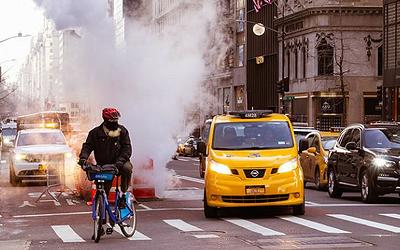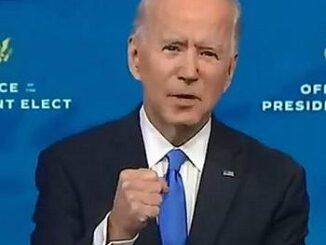
WASHINGTON, DC, April 3, 2020 (ENS) – The Republican administration of President Donald Trump has not let the deadly coronavirus crisis stop it from getting rid of Obama-era federal fuel efficiency standards and replacing them with a less ambitious plan. The Trump plan is estimated to increase carbon emissions by 2.2 billion metric tonnes and cost Americans a total of US$300 billion.
In 2010 under President Barack Obama, the U.S. government established a National Clean Car Standards program to coordinate greenhouse gas emissions and fuel economy standards for light-duty vehicles, including cars and small trucks. The program established standards that increase in stringency every year from Model Year 2012 through Model Year 2025.

The Trump administration fuel rule allows fuel economy and emission standards to increase by just 1.5 percent annually, rather than the five percent annual increases in the 2012 rule adopted under President Obama, a Democrat.
Under the new fuel rule, the standard will increase to just 40.4 miles per gallon by vehicle model year 2026, about six miles a gallon less than the standard required by the 2012 rule.
The finalized rule, prepared by the U.S. Environmental Protection Agency, EPA, and the U.S. Department of Transportation, was unveiled March 31.
“Our final rule puts in place a sensible one national program that strikes the right regulatory balance that protects our environment, and sets reasonable targets for the auto industry,” EPA Administrator Andrew Wheeler said. “This rule supports our economy and the safety of American families.”
The change “reflects the realities of today’s markets,” the Trump administration said, such as more interest in SUVs over smaller cars and automakers’ current use of credits to meet their targets.
But Trump’s less stringent fuel efficiency rule will have major environmental consequences and undermine President Obama’s work to combat the climate crisis.
The fuel economy emissions standards put in place by the Obama administration were projected to save nearly 2.5 million barrels of oil a day by 2030, as well as save consumers over $1 trillion and reduce global warming pollution by six billion metric tons.
Reacting to the move, Obama tweeted a warning, “We’ve seen all too terribly the consequences of those who denied warnings of a pandemic. We can’t afford any more consequences of climate denial. All of us, especially young people, have to demand better of our government at every level and vote this fall.”
A presidential election set for the first Tuesday in November 2020 is focusing the nation’s attention on the transportation decisions President Trump is making.
House Speaker Nancy Pelosi, also a Democrat, said, “The Trump Administration’s anti-science decision to gut fuel standards will unleash massive amounts of pollution into the air at the worst possible time. The American people need and expect strong action to protect public health during the coronavirus pandemic, not corporate giveaways that devastate the air that we breathe.”

“This rule endangers economic security as it harms public health, stealing hundreds of billions of dollars out of the pockets of workers and families during a time of massive uncertainty and job loss,” Pelosi said. “The decision weakens America in the fight against the climate crisis, which is the existential threat of our time, imperiling public health, economic security and national security.”
California Attorney General Xavier Becerra said, “Today the richest, most powerful nation in the world is telling its 300 million-plus people and its economy to shut down and stay put for fear of contamination. Rather than learn from its deadly regulatory backsliding, the Trump administration instead weakens standards that protect our health and environment from polluting contaminants emitted by cars and trucks. That’s unacceptable. And that’s not where California or America will go.”
But there are plenty of Republicans who support the new, more relaxed fuel standards, saying they will make new vehicles more affordable.
U.S. Senator John Barrasso of Wyoming, who chairs the Senate Committee on Environment and Public Works, said, “I applaud the Trump administration for setting common-sense emissions standards for cars and trucks. The old rule would limit consumer choice and increase the cost of purchasing a vehicle. Washington must consider what is best for the whole country. The government shouldn’t make rules that work in cities but not in rural communities. The administration is helping protect Americans’ freedom to purchase a car or truck that meets their needs.”
Peter Welch, president and CEO, National Automobile Dealers Association, NADA, said, “America’s franchised auto dealers continue to support continuous improvements in the fuel economy of the nation’s new-vehicle fleet, as well as federal fuel economy standards that help keep new vehicles affordable. NADA believes that the regulation of fuel economy and greenhouse gas emissions should be examined through the lens of consumer affordability.”
Still, the argument goes on. New York State Dept. of Environmental Conservation Commissioner Basil Seggos, a Democrat, said, the “EPA rollback will result in more air pollution in New York’s communities, more respiratory illnesses, and more New Yorkers dying because of increased air pollution. New York State will continue to fight EPA in court and work to implement the stringent California standards allowed by the federal Clean Air Act. The COVID-19 public health crisis makes it clear that policy must follow sound science.”
California and 22 other U.S. states filed a lawsuit in November challenging the Trump administration’s decision to revoke California’s authority to set stiff vehicle tailpipe emissions rules and require a rising number of zero-emission vehicles.
The November lawsuit follows a separate suit filed in September by 23 states led by California against the National Highway Traffic Safety Administration seeking to undo a parallel determination that federal law bars California from setting tailpipe emission standards and ZEV rules.
U.S. Senator Edward Markey, a Massachusetts Democrat, has been working for stronger fuel efficiency standards for years. The Obama administration’s historic 54.5 mpg fuel standard was partially enabled by the Energy Independence and Security Act of 2007, which included fuel economy standards co-authored by Senator Markey when he was in the House of Representatives.
“As the nation combats one crisis devastating our health and economy, Trump is committed to worsening another crisis devastating our climate and air quality. This dirty cars rule will result in vehicles that are more polluting, more expensive, and less safe,” said Markey, a member of the Senate Environment and Public Works Committee.
“As we learn about how coronavirus is more deadly to people with existing lung conditions, it is especially appalling that Trump would decide to issue a rule now that will result in more dirty air pollution. Even during this health and economic emergency, the rollback of the clean vehicle standards shows that the Trump administration will never waiver from its top priority: boosting Big Oil,” Markey said.
Copyright Environment News Service (ENS) 2020. All rights reserved.
© 2020, Environment News Service. All rights reserved. Content may be quoted only with proper attribution and a direct link to the original article. Full reproduction is prohibited.



